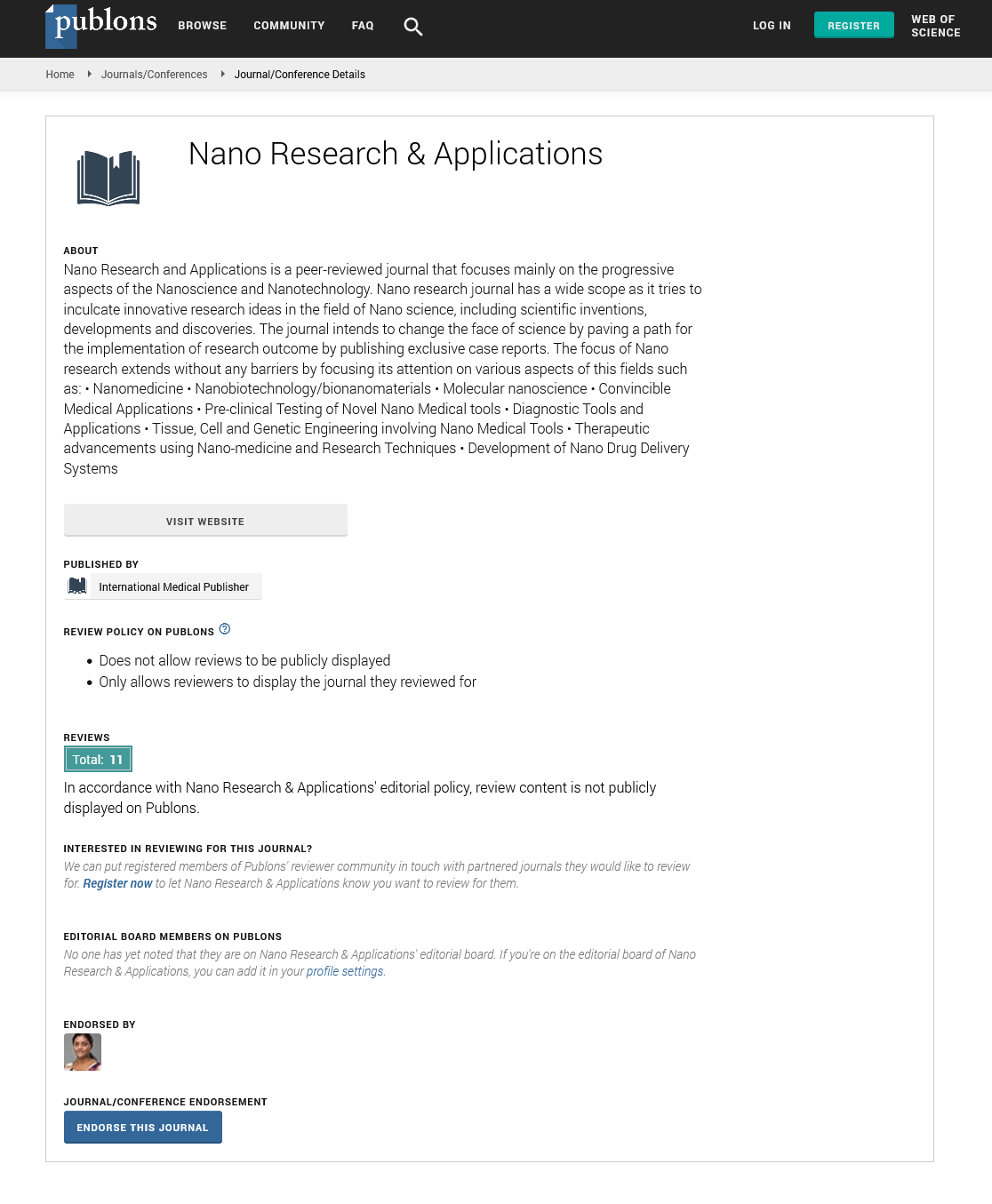ISSN : 2471-9838
Nano Research & Applications
Fluidic stress modulates biomarker expression and therapy response in 3D ovarian cancer nodules
Joint Event on 22nd International Conference on Advanced Materials and Simulation & 22nd Edition of International Conference on Nano Engineering & Technology
December 10-12, 2018 Rome, Italy
Imran Rizvi
University of North Carolina, USA
ScientificTracks Abstracts: Nano Res Appl
DOI: 10.21767/2471-9838-C7-027
Abstract
This presentation will focus on the mechanistic rationale for using lasers in medicine, biology and principles of tumor engineering to address chemoresistance in cancer. Physiological barriers to drug delivery and therapy induced molecular selection pressures preclude durable improvements in survival for many cancer patients. It is increasingly evident that the most effective treatments will involve cooperative regimens that target multiple non-overlapping pathways, while minimizing systemic toxicities. Photodynamic therapy (PDT) is a light based treatment that can improve the therapeutic index of traditional and emerging treatments. The photochemical cytotoxic mechanisms triggered by PDT induce damage to sub cellular organelles, prime tumor cells, disrupt stromal compartments and enhance drug delivery. This presentation will describe key factors that guide the development of PDT based therapeutic regimens. A specific focus is on enhancing the efficacy of camptothecin analogues and platinum based chemotherapies, which are commonly used to manage cancers, but suffer from significant toxicities, poor drug penetration and resistance. PDT overcomes these barriers of efficacy, due to its distinct mechanisms and non-overlapping toxicities. Capturing these attributes in rationally designed combinations leads to synergistic tumor reduction in 3D models and durable tumor control in orthotopic xenograft mouse models for ovarian and pancreatic cancer. The mechanistic basis of these improved outcomes will be presented by harnessing photo initiated sub cellular cytotoxic mechanisms (e.g. damage to mitochondria/ ER and degradation of bcl-2) to prime tumor cells for subsequent mechanistically distinct chemotherapeutic insult, thereby lowering the threshold to tumor destruction; stromal and vasculature disruption to improve drug delivery, significantly enhancing the penetration of chemotherapeutics and increasing intratumoral accumulation by >10 fold and mitigation of chemotherapy induced enrichment of cellular stemness markers (e.g. CD44, CXCR4) to provide significant and sustained reductions in local and distant tumor burden and prolonged improvements in survival. Results will be discussed in the context of imaging and therapeutic applications of light, bioengineered 3D models and targeted drug delivery for inhibition of molecular survival pathways in tumors.
Biography
Imran Rizvi has completed his PhD in Engineering Sciences in the Thayer School of Engineering at Dartmouth College, an MS in Tumor Biology in the Lombardi Comprehensive Cancer Center at Georgetown University, and a BA at Johns Hopkins University. He was an Assistant Professor of Dermatology (tenure-track) at Harvard Medical School (HMS) and an Assistant Biomedical Engineer at the Wellman Center for Photomedicine (WCP), Massachusetts General Hospital (MGH), Boston. His expertise is in imaging and therapeutic applications of light, bioengineered 3D models and animal models for cancer and targeted drug delivery for inhibition of molecular survival pathways in tumors. His K99/R00 (NCI) develops photodynamic therapy (PDT) based combinations against molecular pathways that are altered by fluidic stress in ovarian cancer. He is also Co-PI on an Innovation Award with Bristol-Myers Squibb to develop optical techniques in immuno oncology for light-based modulation of immune response. He has co-authored 39 peer-reviewed publications and five book chapters with a focus on PDT, biomedical optics and molecular targeting in cancer. He is a Council Member of the of the American Society for Photobiology (ASP), Chair of the ASP Awards Committee and Secretary of the Executive Committee of the Pan American Photodynamic Association. He serves in several organizing committees and Scientific Advisory Boards including the Program Committee for SPIE Photonics West (BIOS Conference B0110) and the World Congress of the International Photodynamic Association.
E-mail: imran.rizvi@unc.edu
Google Scholar citation report
Citations : 387
Nano Research & Applications received 387 citations as per Google Scholar report
Nano Research & Applications peer review process verified at publons
Abstracted/Indexed in
- Google Scholar
- China National Knowledge Infrastructure (CNKI)
- Directory of Research Journal Indexing (DRJI)
- WorldCat
- Publons
- Secret Search Engine Labs
- Euro Pub
Open Access Journals
- Aquaculture & Veterinary Science
- Chemistry & Chemical Sciences
- Clinical Sciences
- Engineering
- General Science
- Genetics & Molecular Biology
- Health Care & Nursing
- Immunology & Microbiology
- Materials Science
- Mathematics & Physics
- Medical Sciences
- Neurology & Psychiatry
- Oncology & Cancer Science
- Pharmaceutical Sciences
